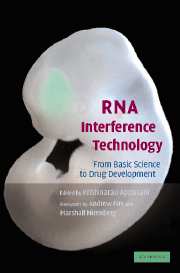Book contents
- Frontmatter
- Contents
- Foreword by Andrew Fire
- Foreword by Marshall Nirenberg
- List of Contributors
- Introduction
- Section one Basic RNAi, siRNA, microRNAs and gene-silencing mechanisms
- 1 RNAi beginnings, Overview of the pathway in C. elegans
- 2 Dicer in RNAi: Its roles in vivo and utility in vitro
- 3 Genes required for RNA interference
- 4 MicroRNAs: A small contribution from worms
- 5 miRNAs in the brain and the application of RNAi to neurons
- Section two Design, synthesis of siRNAs
- Section three Vector development and in vivo, in vitro and in ovo delivery methods
- Section four Gene silencing in model organisms
- Section five Drug target validation
- Section six Therapeutic and drug development
- Section seven High-throughput genome-wide RNAi analysis
- Index
- Plate section
- References
5 - miRNAs in the brain and the application of RNAi to neurons
Published online by Cambridge University Press: 31 July 2009
- Frontmatter
- Contents
- Foreword by Andrew Fire
- Foreword by Marshall Nirenberg
- List of Contributors
- Introduction
- Section one Basic RNAi, siRNA, microRNAs and gene-silencing mechanisms
- 1 RNAi beginnings, Overview of the pathway in C. elegans
- 2 Dicer in RNAi: Its roles in vivo and utility in vitro
- 3 Genes required for RNA interference
- 4 MicroRNAs: A small contribution from worms
- 5 miRNAs in the brain and the application of RNAi to neurons
- Section two Design, synthesis of siRNAs
- Section three Vector development and in vivo, in vitro and in ovo delivery methods
- Section four Gene silencing in model organisms
- Section five Drug target validation
- Section six Therapeutic and drug development
- Section seven High-throughput genome-wide RNAi analysis
- Index
- Plate section
- References
Summary
miRNAs in the brain
Several hundred microRNAs (miRNAs) have been cloned from a wide range of organisms across phylogeny. miRNAs are 19–23 nucleotide transcripts with characteristic 3′ hydroxyl and 5′ phosphate termini cleaved from a ∼70-nt hairpin precursor by Dicer Ribonuclease III (Hütvagner et al., 2001; Ketting et al., 2001). Many miRNAs, often with highly conserved sequences, have been mapped in the genomes of C. elegans, Drosophila, rodents and humans (Lagos-Quintana et al., 2001; Lau et al., 2001; Lee and Ambros, 2001; Lagos-Quintana et al., 2002; Mourelatos et al., 2002; Dostie et al., 2003). Based on the length, hairpin structure and conservation the total number of miRNAs in the Drosophila genome has been estimated to be 110 (Lai et al., 2003) and in the human genome to be 255 (Lim et al., 2003). Some miRNAs are organized in the genome as clusters which can be separated by intervals as short as a few nucleotides (Lagos-Quintana et al., 2001; Lau et al., 2001). Despite the high degree of conservation of miRNAs, their functions in general, and in mammals particularly, have not been well defined. The first two miRNAs discovered, lin-4 and let-7, were found in C. elegans where they control developmental timing. These short transcripts form imperfect base pairing with elements within the 3′ UTR of target mRNAs and attenuate their translation (Lee et al., 1993; Wightman et al., 1993; Olsen and Ambros, 1999; Reinhart et al., 2000; Slack et al., 2000).
Information
- Type
- Chapter
- Information
- RNA Interference TechnologyFrom Basic Science to Drug Development, pp. 84 - 100Publisher: Cambridge University PressPrint publication year: 2005
